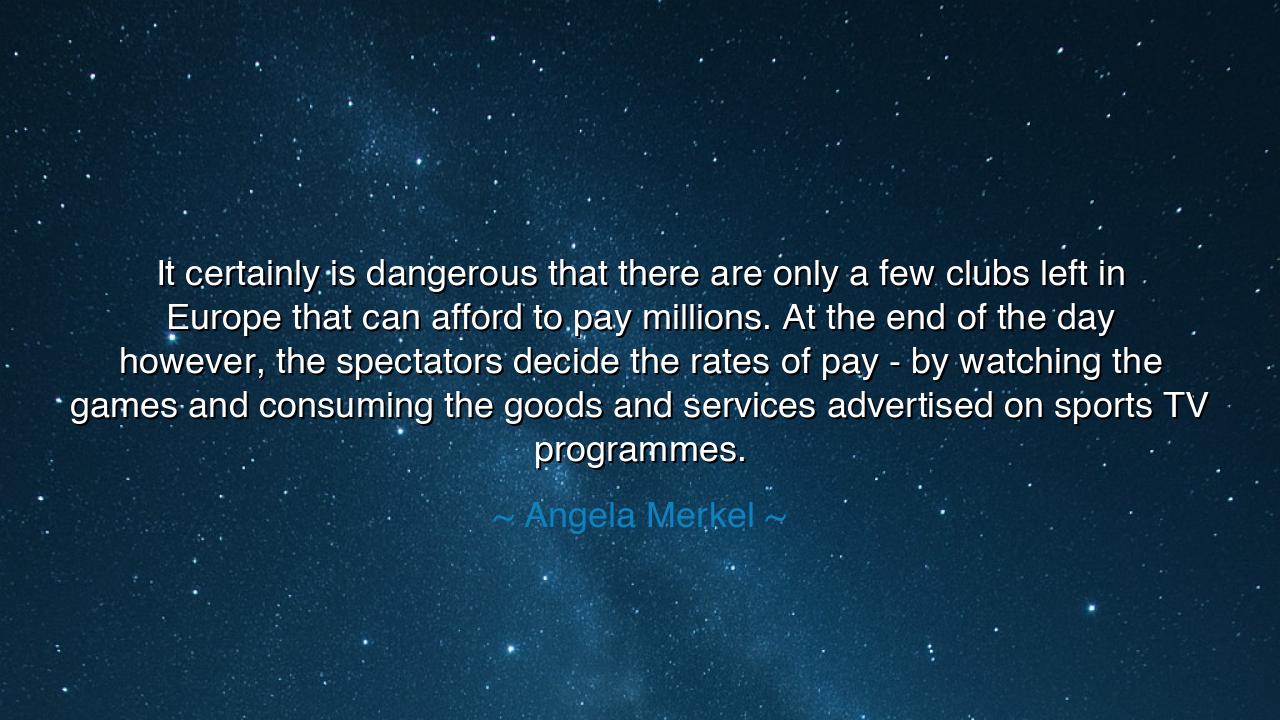
It certainly is dangerous that there are only a few clubs left
It certainly is dangerous that there are only a few clubs left in Europe that can afford to pay millions. At the end of the day however, the spectators decide the rates of pay - by watching the games and consuming the goods and services advertised on sports TV programmes.






Hear, O seekers of wisdom, and incline thine ear to the words of the past, for the sayings of rulers and leaders are not mere whispers lost to the wind, but echoes of truth that thunder across the ages. When Angela Merkel, a steward of nations, declared that “It certainly is dangerous that there are only a few clubs left in Europe that can afford to pay millions. At the end of the day however, the spectators decide the rates of pay—by watching the games and consuming the goods and services advertised on sports TV programmes,” she spoke not only of sport, but of the eternal dance between wealth, power, and the will of the multitude.
This utterance reveals a paradox as old as empires: the few who wield gold and influence seem to hold dominion, yet it is the many—the spectators, the common folk, the unseen multitude—who, through their daily choices, uphold the mighty. Even the colossi of Rome, clad in marble and steel, required the cheering voices of the people to grant them glory. Without the gaze of the crowd, the gladiator’s strike would have no meaning, and the emperor’s games no purpose. So too in the modern stadiums of Europe, where fortunes flow not solely from the coffers of kings, but from the eyes and purses of those who watch.
Think on the tale of the Roman Colosseum, wherein emperors sought the adoration of thousands through lavish contests. They paid dearly to stage spectacles of blood and pageantry, yet the true price was set not by Caesar’s decree but by the crowd’s demand for awe. When the masses grew restless, emperors spent more, built greater wonders, and risked more extravagant gifts to appease the multitude. Was it not the collective hunger of the people that forged both Rome’s triumphs and her eventual ruin? Thus it is today: a footballer’s wages rise not from the whims of a single patron, but from millions of eyes fixed upon the screen, each glance adding coin to the treasury.
Yet here lies a danger, as Merkel warns. When only a few clubs—wealthy beyond measure—may command the highest talents, the game itself risks distortion. Competition falters, the weaker are cast aside, and the sacred joy of sport may become a hollow display of power. Just as the empires of old fell to their own excess, so too may the game falter if the balance of wealth and passion is lost. The danger is not only to the sport but to the spirit of fairness, for when the field is uneven, what lesson remains for the youth who look upon it with hope?
But take heed, for the teaching is not despair, but empowerment. Merkel’s words remind us that the true power lies not in the gilded halls of the few, but in the countless acts of the many. If the spectators choose differently—if they watch less, consume less, demand fairness, and value integrity over mere spectacle—they may yet bend the course of history. The rulers of industry, like the emperors of Rome, are but reflections in the mirror of the people’s desire. Break the mirror, and the image fades.
Thus, O children of tomorrow, let this lesson be written upon your hearts: your choices are not small. Every coin you spend, every show you watch, every voice you raise, is a thread in the vast tapestry of destiny. Do not say, “I am but one; what difference can I make?” For the greatest rivers are born of countless drops, and the roar of the crowd is but the sum of single voices. When the many awaken to their strength, the few must yield.
Therefore, let us walk wisely. Support not only the mighty, but also the humble; value not only the grand spectacle, but the honest struggle; and measure greatness not by gold, but by the joy of the game and the fairness of its play. In your own lives, too, apply this wisdom: spend with care, watch with discernment, and live not as slaves to spectacle, but as masters of your own will. In this lies both freedom and power.
And so, as the ancients once taught around the fire, so let us teach again: the fate of kingdoms, the wealth of empires, even the wages of champions—all bend before the unseen hand of the people’s choice. Guard that choice well, for it is both your burden and your crown.






AAdministratorAdministrator
Welcome, honored guests. Please leave a comment, we will respond soon